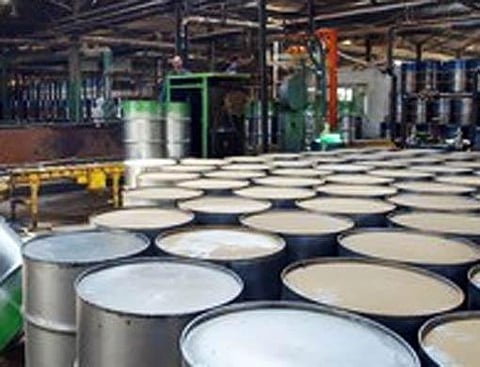Oil at $60.56: Slightly down, but sentiment remains strong
Supply cuts expected to extend beyond March 2018, but rising US shale production drags on prices

Singapore, Dubai: Oil prices eased on Tuesday as traders took profits following days of gains and as the prospect of increasing US exports dampened overall bullish sentiment that has driven Brent above $60 per barrel.
Traders said that Iraq's move to increase oil exports from its southern ports by 220,000 barrels per day (bpd) to 3.45 million bpd to make up for supply disruptions from its northern Kirkuk fields had also weighed on Brent.
Brent crude futures, the international benchmark for oil prices, were at $60.56 per barrel at 12.33pm in Dubai, after briefly touching $61 October 30, Monday. They have been 37 percent up since their 2017-lows last June.
US West Texas Intermediate (WTI) crude futures holding firm $54.16 at 12.27pm (Dubai time), 2 cents higher than their last close and near their highest level since February — and up around 28 percent since 2017-lows marked in June.
Traders said there was profit-taking earlier after crude prices rose by around 5 percent in October.
Amid generally upbeat market sentiment, some analysts also warned of an overbought market.
"US shale output could keep a lid on prices over the medium to long-term," said Shane Chanel, equities and derivatives adviser at ASR Wealth Advisers.
WTI's $6.76 per barrel discount to Brent is a result of rising American crude production, which is up almost 13 percent since mid-2016 to 9.5 million barrels per day (bpd), making US crude exports highly profitable.
"The large differential has opened the door on regional arbitrage, driving a spike in US crude exports over recent weeks," BMI Research said in a note.
On Tuesday, despite brief price dips, market sentiment remained confident, fuelled by a pledge led by the Organization of the Petroleum Exporting Countries (Opec) and Russia to hold back about 1.8 million barrels per day (bpd) in oil production to tighten markets and prop up prices.
While the actual cuts aren't quite as high as the target, analysts say overall compliance has been strong. "The OPEC deal compliance has been very firm, with rates averaging 86 percent since January," according to Bank of America Merrill Lynch.
The pact runs to March 2018, but Saudi Arabia and Russia have voiced support to extend the agreement.
Opec meet on November 30
Opec is scheduled to meet officially at its headquarters in Vienna, Austria, on November 30.
"The fear of oversupply could easily turn to a fear of undersupply if inventories keep declining like they
have been and demand continues to grow," said William O'Loughlin, investment analyst at Rivkin Securities.
Meanwhile, oil major BP said on Tuesday that it expected global oil stock levels to return to "normal levels" by the end of next year.
Saudis take lead
Saudi Arabia, Opec’s biggest oil producer, is also a leader when it comes to slashing the crude price the country needs to balance its budget.
The kingdom will need oil to trade at $70 a barrel next year to break even, the Washington-based International Monetary Fund said Tuesday in its Regional Economic Outlook for the Middle East and Central Asia.
That's down from a break-even of $96.60 a barrel in 2016, the biggest drop of eight crude producers in the Persian Gulf. The break-even is a measure of the crude price needed to meet spending plans and balance the budget.
Gulf oil producers are cutting spending and eliminating subsidies after crude plunged from more than $100 a barrel in 2014 to average just over half that this year.
The need to curb spending is more urgent with the Organization of Petroleum Exporting Countries cutting output to reduce a global glut. Oil will trade at $50 to $60 a barrel for the "medium term," the IMF said.
"The reality of lower oil prices has made it more urgent for oil exporters to move away from a focus on redistributing oil receipts through public sector spending and energy subsidies," the IMF said.
Iran, Iraq, Kuwait and Qatar will have break-evens below the oil price, more than enough to balance the budget in 2018, according to IMF estimates and forward Brent price data compiled by Bloomberg.
None of the producers have yet created economies that will support their population "once hydrocarbon resources are exhausted," the IMF said.


